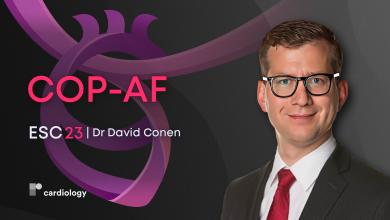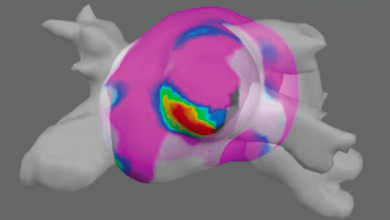Search results
Author(s):
Simon Ermakov
,
Melvin Scheinman
Added:
3 years ago
Arrhythmogenic right ventricular cardiomyopathy (ARVC) is an inherited cardiomyopathy characterised by progressive replacement of the ventricular myocardium by fibrofatty tissue.1 Patients with the disease are predisposed to ventricular arrhythmias, heart failure and sudden cardiac death.
Pathophysiology
ARVC has a strong genetic basis with most disease variants displaying an autosomal dominant…
View more
Author(s):
David J Callans
Added:
3 years ago
Premature ventricular contractions (PVCs) are very common cardiac arrhythmias, detected on up to 75% of Holter monitors of ambulatory patients.1 Although PVCs in the setting of advanced structural heart disease have independent negative prognostic implications,2 the majority of PVCs are quite benign, associated with neither symptoms nor signals of future harm. For an important minority, PVCs…
View more
Author(s):
Pok Tin Tang
,
Duc H Do
,
Anthony C Li
,
et al
Added:
3 years ago
Ventricular arrhythmias remain a major contributor to cardiac morbidity and mortality worldwide, despite ongoing research and implementation of novel therapeutic interventions. Modern management of patients with ventricular arrhythmias requires a multidisciplinary team approach, especially in complex presentations with a background of multiple medical comorbidities.1,2 Such teams may include…
View more
ESC 23: COP-AF Trial
Author(s):
David Conen
Added:
7 months ago
Video
Author(s):
Jeffrey J Hsu
,
Ali Nsair
,
Jamil A Aboulhosn
,
et al
Added:
3 years ago
Monomorphic ventricular arrhythmias (MMVA) are not uncommon in athletes,1,2 yet their presence appropriately raises concern among practitioners for possible increased risk of sudden cardiac death (SCD) during sports activity and competition. While all MMVA detected in athletes warrant further evaluation,1 a majority of MMVA in this population are likely to be benign. In some instances of so…
View more
Author(s):
Amit J Thosani
,
Paul Gerczuk
,
Emerson Liu
,
et al
Added:
3 years ago
Atrial fibrillation (AF) is the most common cardiac arrhythmia worldwide. In 2010, the prevalence of AF in the US was estimated at 5.9 million.1 The decision to pursue treatment to maintain sinus rhythm is driven by disabling symptoms related to AF; including palpitations, dyspnoea, fatigue, stroke and congestive heart failure. Percutaneous catheter-based ablation is an established therapy for…
View more
Author(s):
Justin Hayase
,
Duc H Do
,
Noel G Boyle
Added:
3 years ago
The ICD is an important therapy for both primary and secondary prevention of sudden cardiac death in selected patients. The role for defibrillation threshold (DFT) testing either intraoperatively or postoperatively has changed significantly over the past few decades, and it is no longer routinely recommended in patients undergoing left-sided transvenous ICD implantation.1–7 The definition of the…
View more
Author(s):
Maya S Verma
,
Maria Terricabras
,
Atul Verma
Added:
2 years ago
Author(s):
Konstantinos C Siontis
,
Hakan Oral
Added:
3 years ago
Advanced catheter-based technologies employed for the ablation of symptomatic atrial fibrillation (AF) have revolutionised the management of this common sustained arrhythmia. In the late 1990s, premature depolarisations originating from the myocardial sleeves within the pulmonary veins were recognised to initiate AF. This landmark discovery rendered pulmonary vein isolation (PVI) as the…
View more
Author(s):
Rahul K Mukherjee
,
Louisa O’Neill
,
Mark D O’Neill
Added:
3 years ago
Recurrent ventricular tachycardia (VT) in patients who have an implantable cardioverter-defibrillator (ICD) with subsequent shocks is associated with reduced quality of life and an adverse prognosis. Pharmacological treatments are associated with significant side-effects. Catheter ablation has been used to reduce the number of ICD therapies in patients with ischaemic and non-ischaemic…
View more













